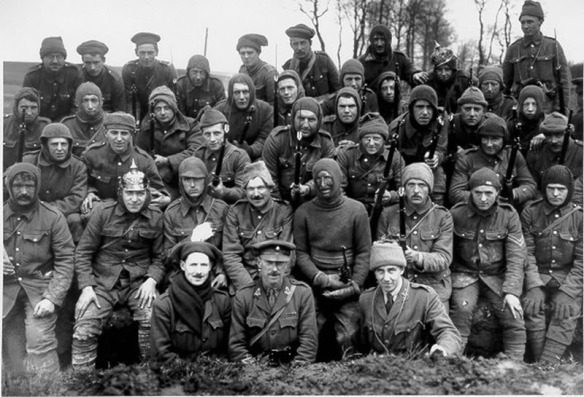I really believe that I am after all a coward for I don’t like patrolling…The battalion who alternates with us here have lost three officers (or rather two officers and an NCO) on this business in front of my trenches. Let me try to picture what it is like. I am asked to take out an ‘officer’s patrol’ of seven men; duties – get out to the position of the German listening post (we know it), wait for their patrol and ‘scupper’ it; also discover what work is being done in their trenches.
I choose my favourite corporal (a gentleman, a commercial traveller for the Midland Educational in civilian life) and my six most intelligent and most courageous men. My sentries and those of the first platoon of the battalion on my right are told we are going out so that we shan’t be fired on. Magazines are charged to the full, one round in the breech; bayonets are examined to see if they slip out of the scabbard noiselessly; my revolver is nicely oiled; all spare and superfluous parts of equipment is left behind. Everything is ready.
As soon as the dusk is sufficiently dark, we get out into the front of the trenches by climbing up on to the parapet and tumbling over as rapidly as possible so as not to be silhouetted against the last traces of the sunset. No man feels afraid for we have grown accustomed to this thing now, but every man knows that he has probably seen his last sunset, for this is the most dangerous thing in war. Out we walk through the barbed wire entanglement zone through which an approaching enemy must climb, but we have a zigzag path through the thirty yards or so of prickly unpleasantness; this path is only known to a few. The night has become horribly dark already, and the stillness of the night is broken only by the croaking of many frogs, the hoot of an owl and the boom of distant guns in the south. The adventure has commenced.
We lie down in the long grass and listen. Nothin’ doin’. I arrange my men in pairs – one to go in front and one to either flank, the corporal and myself remaining in rear, but the whole party is quite close together, practically within whispering distance of one another. We all advance slowly and carefully, wriggling along through the long grass for a hundred yards or so, past the two lines of willow trees and across the stream, now practically dry. There we lie and wait and listen. One pair goes out another fifty yards or so, nearly to the German wire to see if there is anything about. Nothing is discernible, so they return, and for another hour we lie in absolute silence like spiders waiting for flies. It is a weary game and extremely trying to one’s nerves, for every sense especially hearing and sight are strained to the utmost. Tiny noises are magnified a hundredfold – a rat nibbling at the growing corn or a rabbit scuttling along give us all the jumps until we learn to differentiate the different sounds. In the German trenches we hear the faint hum of conversation. Nothing is to be heard near us, but there is a very ominous sign – no shots are being fired from the trenches in front of us, no flares are being sent up and there is no working party out. This points to only one thing and that is that they also have a patrol out. There is no other conclusion.
Suddenly quite close to the corporal and myself there is a heavy rustling in the long grass on the right. Now, if never before, I know the meaning of – is it fear? My heart thumps so heavily that they surely must hear it, my face is covered with a cold perspiration, my revolver hammer goes back with a sharp click and my hand trembles. I have no inclination to run away – quite the reverse – but I have one solitary thought: I am going to kill a man. This I repeat over and over again, and the thought makes me miserable and at the same time joyful for I shall have accounted for one of the blackguards even if I go myself. Do they know we are here? How many are there? Are they armed with bombs like most German patrols? However, our queries remain unanswered, for quite abruptly they change their direction and make off to the right where to follow them would be only courting certain disaster.
So with great caution we come in and breathe again when we are safely inside the trench. I give instructions to the sentries to fire low down into the grass but it is very improbable that the German patrol will get anything but a fright.
Note: by Second Lieutenant H E Cooper, Royal Warwickshire Regiment
